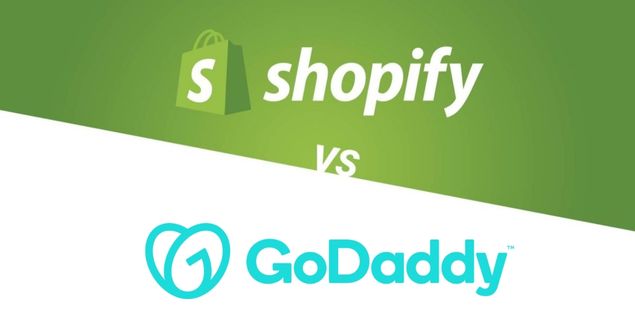Are you looking for a host for your eCommerce store? Choosing the right web hosting provider is very important because it determines your success rate. Your website would be hosted at their servers and from them you get access to your domain name, email accounts, analytics tools, etc.
There are two major players in the web hosting space today. They are GoDaddy & Shopify. Which one should you choose? Well, let’s take a look and see which features each company offers, which makes it easier for you to decide.
Hosting is the backbone of every online business. It serves as its foundation, giving companies visibility into traffic stats, sales performance, customer communication and much more.
Some businesses opt for shared hosting or dedicated hosting depending on their budget and project requirements. The price varies based on the number of domains, storage capacity and other resources provided.
A successful ecommerce website requires solid hosting services. In this article, we'll compare the key differences between GoDaddy and Shopify and identify the benefits and drawbacks of both. Also, we'll discuss why choosing the right hosting plan is crucial for your ecommerce business growth.
What is Shopify?
Shopify is one of the most popular eCommerce platforms for small businesses. They provide tools such as a customer community, payment gateways, shipping tools, and inventory management tools.
Shopify also has third party apps for things like product listings, SEO, and Facebook ads. It is trusted by many popular brands namely Tesla, Netflix, BBC, and so on. With this hosted solution, you can quickly set up an ecommerce site for your business.
What makes Shopify different from others?
Shopify is a web application platform that enables users to create stores for selling physical goods, digital downloads, membership sites, events and online courses. The product has a lot of features, such as eCommerce, which allows anyone to sell anything directly through a website.
Shopify offers an easy-to-use inventory system and lets you sell on other platforms such as Facebook, Instagram, Pinterest and many more. However, Shopify's free trial period is of a very minimum period. If you don’t utilize Shopify Payments as your payment gateway, you’ll have to pay Shopify transaction fees as well.
The platform also includes tools like analytics, shipping management, customer support, payment processing, marketing automation, SEO/SEM, apps, themes, and inventory management. With these components, Shopify aims to provide the best business solution possible.
Shopify Pros and cons
Pros:-
Shopify provides its users with more tools for customizing their online store. There are many templates, ways to customize and integrations to add whatever you need has been proved.
Shopify also offers a built-in payment processor, which can be a good solution for many businesses; however, for those who already use a payment processor, Shopify also works with more than 100 payment providers.
Cons:-
The drawback of Shopify is that it is significantly more expensive than GoDaddy. However, this is because it offers more. Shopify has several plans dedicated to e-commerce, whereas GoDaddy only has one plan.
Another con is that setting up your store with Shopify will possibly take longer because there are more features. Shopify transaction fees charges for any third-party payment processor you use.
Shopify: Themes and Editor
Shopify’s selection of free themes makes it easy to get started. Just pick the one you like the most and tweak it to suit your business. All Shopify themes work responsively, meaning your online store will look fab, on any device your website visitors use.
As well as its free templates, Shopify also offers 64 premium themes. Alternatively, you can start from scratch with a blank template or upload a custom theme as well.
Once you’re ready with the theme, you can use Shopify's in-built editor to preview the look of your e-store in real-time. From there you can use the editor's drag-and-drop interface to bring your vision into reality.
Shopify Inventory Management
Shopify makes it easy for its user to stay on top of their stock. And also has POS integration so that you manage both your online and offline stock.
This same feature also enables you to keep a check on how much stock you have left and your past inventories. Plus, you can also integrate with accounting tools to keep note of your profit margins.
Shopify Reporting and Analytics
If data and graphs are important to your business, Shopify will hold good appeal with its reporting dashboard. Here, you can see who’s visiting your website and when, and you can even see where they’re navigating to on your website. You can also analyze the speed of your website and all your transactions and many more.
Shopify’s Marketing Tools
From built-in SEO tools to an easy-to-navigate blogging engine where you can keep customers up to date, it provides simple-to-use marketing tools.
The marketing features Shopify has to offer:
Campaign creation
Email marketing
Google Smart Shopping
Facebook Ads
Access to a virtual assistant to whom you can assign tasks and get marketing tips from
You'll get receive insights to help you better target your marketing
What is GoDaddy?
GoDaddy is one of the world’s largest domain registrars and web hosting providers. Based in Scottsdale, Arizona, the company was founded in 1997 and has been operating ever since. GoDaddy is a web hosting and domain registration company based in Scottsdale, Arizona. GoDaddy has + 20 million clients and over 9,000 workers globally in 2021. Today, Godaddy is the largest domain registrar and hosting service worldwide.
What makes GoDaddy so good?
A lot of things go into making any product great but one thing really stands out when you look at what makes GoDaddy successful. They provide outstanding customer service. By consistently taking care of customers who use their domain registration tools, they have built strong relationships and word-of-mouth marketing campaigns. This has helped them achieve phenomenal growth. In fact, for two years running they have been named the best web hosting company by PC Magazine!
GoDaddy utilizes ADI to establish online stores. It's a convenient, easy and quick option. It also caters to a wide number of businesses, making it a usable option for practically any eCommerce assignments. However, certain of GoDaddy’s features are limited in scope and quality, and you can’t sell digital items.
GoDaddy provides hosting, domain registration, email support, webmail, and other Internet tools. They also provide website builders for all levels of experience. The company has been around since 1994 and they offer free website building tools, such as WordPress.com, TypePad, and Squarespace.
GoDaddy Pros and cons
Pros:-
GoDaddy is the less expensive option to choose from and, since there’s less to set up, it can be easier to create your online store.
Another pro is the ability to easily sync your store online so your brand exposure and drive more sales. Its mobile-optimized designs also mean you can appeal to more customers on whichever they prefer. Plus, users review the brand’s customer service, which can be good for beginners.
Cons:-
A con for small-business owners who need a more robust online store can be difficult to customize and scale. It also has fewer payment processors to select from, which can be a disadvantage for business owners.
GoDaddy’s Themes and Editor
GoDaddy has a good selection of attractive themes with about 100 variants across 22 main themes and all responsive so will work seamlessly on any device.
GoDaddy suggests themes based on the industry. This helps you find the perfect template for your website.
The suggested template is automatically loaded with industry-relevant you can even switch these out for your own preference.
From content to video, to audio and HTML – you can easily edit every stage of your website.
GoDaddy Inventory Management
You can track stock levels across multiple sales channels by integrating with any online marketplace you're using. This will sync your inventory so you can see exactly what products are in stock. It also permits customers to place orders even if you’re out of stock by allowing you to create and manage backorders.
GoDaddy Reporting and Analytics
Insight comes as part of the web builder and is a one-stop shop for all things data. The tool analyzes your industry and offers you helpful, sector-specific recommendations. Just set your business aims and the tool will generate a few actionable points to help you get off to a good start.
You can even integrate with Google Analytics to view how well your website is performing.
"GoDaddy InSight™ provides tailored action plans 99.9% uptime with an award-winning support team Built-in marketing tools and expertise"
Source: hostingadvice.com
GoDaddy’s Marketing Tools
GoDaddy has a range of helpful features:
It's free to send email marketing and abandoned cart recovery emails
You can integrate with selling and online marketplaces
You can send SMS notifications to customers
SEO tools
You can enable customers to leave product reviews
Let’s take a look at the important differences between these two products.
1. Pricing:
GoDaddy Pricing
GoDaddy has four monthly pricing plans for the website developer which are:
- Basic: $11.99 per month
Premium: $21.99 per month
Commerce: $24.99 per month
Commerce Plus: $44.99 per month.
GoDaddy plans allow you:
Create a website with its website developer.
Connect a custom domain name to your website.
Accept online payments & booking.
Use ‘GoDaddy Payments’ (the USA only) to sell products in a physical store.
Access marketing analytics.
Shopify pricing
Shopify offers five pricing plans to choose from which are:
- Lite: $9 per month
Basic: $29 per month
Shopify: $79 per month
Advanced: $299 per month
Plus: custom pricing depending on requirements.
Shopify plans allow you:
You can create a standalone online store.
You can sell on online marketplaces (Amazon, Flipkart etc.) and on social media as well.
Create promotional discount codes.
multilingual and multi-currency selling tools are also available.
It gives you integrated shipping solutions.
Shopify is super simple to use and simple to sign up for a free trial. The drag-and-drop design makes store designing super easy, and there are lots of visual instructions which will guide you. However, Shopify can’t compete with GoDaddy in the case of the use process.
With ADI, GoDaddy is able to create a complete eCommerce store within a few minutes. All you have to do is answer a few questions about your business and sector and you will get a ready-to-publish website.
However, you should have noticed that with the usage of ADI, GoDaddy limits your creativity, thought process & idea. If you opt to build a brand’s vision within your store, Shopify is good because it provides you with the tools to ideally implement.
3. Page Speed
1) Shopify Page Speed
Shopify’s page loading speed is in 309 milliseconds, which is the optimal loading time for any website. As Google suggested, a loading time of 500 milliseconds! Shopify offers a great overall user experience because of its quick response times.
2) GoDaddy Page Speed
Over the last 10 months, the GoDaddy test website has had a great average page loading speed of under 430 milliseconds.
Summary
Shopify vs GoDaddy is a competitor for each other and challenges audiences to choose an option when building an online store or a personal website. Both Shopify and GoDaddy are beginner-friendly, Therefore, choosing which goes with your platform might be difficult to decide.
Shopify is super simple to use and simple to sign up for a free trial. With ADI, GoDaddy is able to create a complete eCommerce store within a few minutes. All you have to do is answer a few questions about your business and sector and you will get a ready-to-publish website.
Shopify’s page loading speed is in 309 milliseconds, which is the optimal loading time for any website. Over the last 10 months, the GoDaddy test website has had a great average page loading speed of under 430 milliseconds.
Must read articles: Strategies to drive traffic to your website





